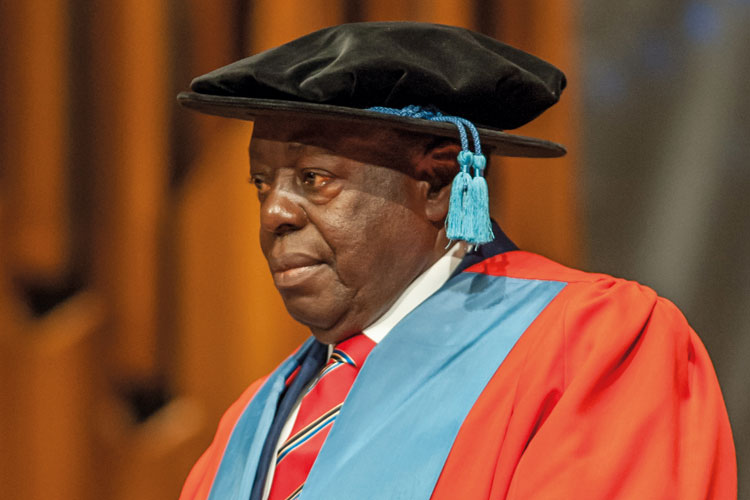PEOPLE & POLITICS

SCRAP TWO-TERM LIMIT, ADOPT SINGLE SIX-YEAR TENURE FOR PRESIDENTS AND GOVERNORS – AFE BABALOLA
As Nigeria grapples with the challenges of democratic governance, the call for political reform grows louder. Among the most pressing proposals is replacing the current two-term (eight-year) system for Presidents and Governors with a single, non-renewable six-year term.
According to legal icon Afe Babalola, this reform goes beyond administrative adjustment—it signals a national awakening. He argues that the two-term model, inspired by foreign democracies, has failed Nigeria, fostering corruption, mediocrity, and an election culture marred by violence and desperation.
The Problem with Two Terms
In theory, a two-term system should allow leaders to consolidate their reforms and ensure accountability. But in Nigeria, the first term is often consumed by political maneuvering—building alliances, securing loyalties, and preparing for re-election. Governance becomes secondary. The second term, free from electoral pressure, frequently results in complacency and unaccountable leadership. This cycle of inefficiency, known as the "second-term syndrome," has plagued leaders at both state and national levels.
Costly, Violent Elections
Nigeria’s electoral process is not only expensive—it is dangerous. Billions are spent on campaigns, with candidates, parties, and political godfathers fueling vote buying, thuggery, and electoral manipulation. The intense pressure to win or retain power has turned elections into high-stakes battles, often resulting in violence, bloodshed, and widespread disenfranchisement.
Babalola argues that a single six-year term would significantly reduce the desperation that fuels this toxicity. With no re-election pressure, leaders can focus on governance from day one. Elections would become less hostile, allowing INEC and security agencies to function more independently and effectively. Importantly, billions of naira could be redirected to social development.
Governance with Urgency
A six-year term instills a clear deadline. Knowing they won’t seek re-election, leaders are more likely to act with urgency, focusing on impact rather than personal ambition. It encourages bold, long-term reforms and discourages distractions like sycophancy and legacy-polishing. Unlike the current four-year term, which often ends just as momentum builds, six years offer enough time for planning, execution, and policy consolidation.
Breaking the Grip of Godfathers
Godfatherism remains a dangerous undercurrent in Nigerian politics. Power brokers bankroll candidates in exchange for loyalty and access to public resources. Under the two-term model, officeholders seeking a second term often surrender their independence.
However, with just one term, politicians are less likely to bow to such pressures. A six-year tenure empowers leaders to prioritize service over patronage, paving the way for visionary, reform-driven candidates untethered from political godfathers.
Promoting Equity and Inclusion
Nigeria’s diversity—ethnic, religious, and regional—demands a fair system of power rotation. The two-term model often sidelines regions for up to eight years, fostering marginalization and tension. A single six-year term accelerates leadership rotation, giving more zones the opportunity to produce top officeholders, strengthening unity and the federal character principle.
Less Politics, More Policy
Under the current system, politics often trumps policy. Leaders spend their first term focused on re-election, and their second protecting their legacy or grooming successors. This hinders long-term development. A one-term system allows for full-term governance, minimizing political distractions and enabling consistent policy implementation—crucial for sectors like education, healthcare, infrastructure, and power.
Global Perspectives
The single-term model isn’t new. Mexico has operated a six-year, non-renewable presidential term since 1917, with positive outcomes in democratic stability. Countries like Colombia and Paraguay also follow similar systems. In Africa, nations like Liberia are currently debating term limit reforms. Notably, former Nigerian President Goodluck Jonathan proposed a single six-year term in 2011 to reduce electoral distractions—though it was rejected then, the idea is gaining renewed relevance today.
A Shift in Political Culture
Beyond structure, Babalola emphasizes a deeper cultural shift—from power obsession to service-driven leadership. A single six-year term sends a strong message: leadership is a rare opportunity, not a personal empire. It demands focus, vision, and impact. This mindset can trickle down across all tiers of government, creating a more efficient, accountable public sector.
Conclusion
Adopting a six-year single term for Presidents and Governors is a bold step toward genuine reform. It tackles political violence, curbs corruption, enhances inclusivity, and allows for purposeful governance. Nigeria must break the cycle of dysfunctional leadership and embrace a system that prioritizes service over ambition.
“A new Nigeria is possible,” Babalola concludes, “but it begins with new leadership—driven not by the hunger for power, but by the hunger to serve.”
"This represents a significant development in our ongoing coverage of current events."— Editorial Board









